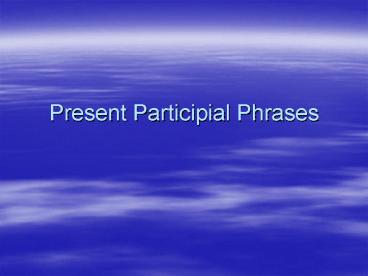Present Participial Phrases - PowerPoint PPT Presentation
1 / 9
Title:
Present Participial Phrases
Description:
A phrase is a group of words that does not have both a subject and a verb ... Waving to their grandparents, they left for the airport. Waving to their grandparents, ... – PowerPoint PPT presentation
Number of Views:524
Avg rating:3.0/5.0
Title: Present Participial Phrases
1
Present Participial Phrases
2
What is the difference between a phrase and a
clause?
- A phrase is a group of words that does not have
both a subject and a verb - Sally washed the dishes for her mother.
A clause is a group of words that DOES have BOTH
a subject and a verb.
for her mother.
Waving to their grandparents, they left for the
airport.
Waving to their grandparents,
When her friends arrived, she offered them a soda.
When her friends arrived
My sister will need to do the dishes as soon as
she can so that she will be ready when her date
arrives.
My sister will need to do the dishes as soon as
she can so that she will be ready when her date
arrives.
3
What is a present participle?
- Verb forms ending in ing
- Walking
- Hoping
- Hopping
- being
4
What is their function?
- They modify nouns or pronouns
- In other words they tell you which one or what
kind about the word being modified. - The student running down the hall was tardy to
class. - Running to catch up with his sister, John fell
and broke his arm.
5
How do I tell where it begins and where it ends?
- It begins with the present participle and
contains any complements or modifiers
6
Where is it located in a sentence?
- The present participial phrase will appear
directly before or after the noun or pronoun it
modifies. - The student running down the hall was tardy to
class. - Running to catch up with his sister, John fell
and broke his arm.
7
How is a present participial phrase punctuated?
When the present participial phrase follows the
noun or pronoun it modifies, separate it from
the rest of the sentence with commas if it is a
nonessential phrase if it is essential, no
commas are used.
- When the present participial phrase comes before
the noun or pronoun it modifies, always separate
the phrase from the rest of the sentence with a
comma. - Running to catch up with his sister, John fell
and broke his arm.
The student running down the hall was tardy to
class.
John, running down the hall, was tardy to class.
8
Verb vs. Adjective
- When a present participle has a helping verb
before it, it is functioning as a verb - is running
- has been galloping
- might be recording
- would have been consuming
9
- When it has no helping verb in front of it and
is, at that time, modifying a noun or pronoun, it
is functioning as an adjective. - Forrest Gump became a running machine at one
point in his life. - That galloping horse has lost its rider.
- The recording studio will be available today at
1000 a.m.































